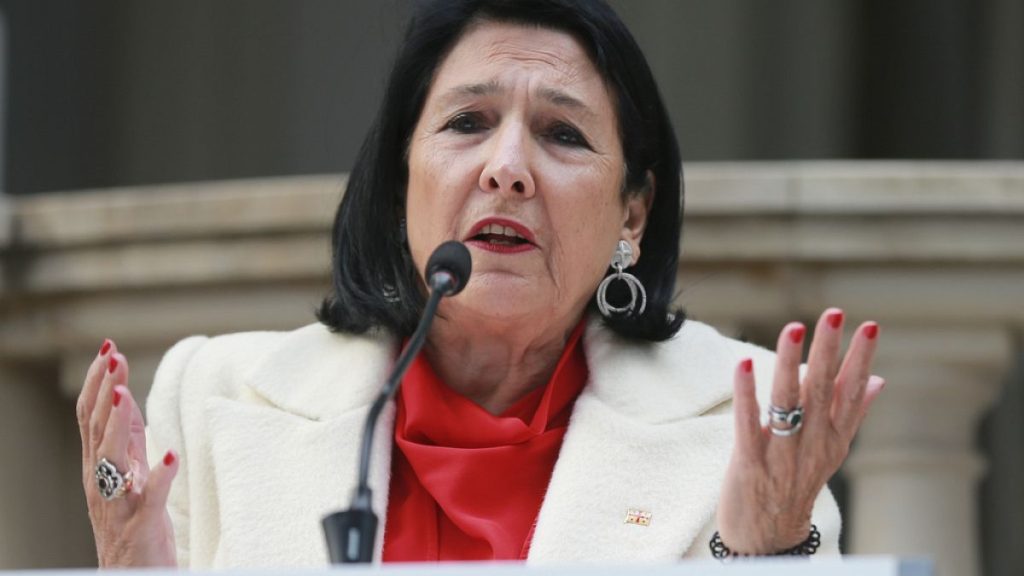The political landscape of Georgia underwent a significant shift on Sunday, December 17, 2023, marked by the controversial inauguration of Mikheil Kavelashvili as the new president. This event, orchestrated by the ruling Georgian Dream party, solidified their control over the country’s political apparatus, raising concerns about Georgia’s democratic trajectory and its aspirations for closer ties with the European Union. Outgoing President Salome Zourabichvili, denouncing the inauguration as a “parody” and asserting her continued legitimacy as the rightful president, vacated the official residence in Tbilisi, signaling her refusal to recognize the new administration. This move underscores the deep political divisions within the country and the opposition’s strong resistance to Georgian Dream’s tightening grip on power.
Kavelashvili’s ascension to the presidency followed an election process widely criticized by the opposition and international observers. As the sole candidate on the ballot, his victory was virtually assured due to Georgian Dream’s dominance over the 300-seat electoral college, a body established in 2017, replacing direct presidential elections. This system has been a point of contention, with critics arguing it undermines democratic principles and concentrates power within the ruling party. Zourabichvili’s defiant departure from the presidential residence reflects her rejection of the electoral process and her assertion that Kavelashvili’s presidency lacks legitimacy. Her declaration of continued legitimacy, coupled with her call for unity among her supporters, sets the stage for a potential power struggle and further political instability.
The inauguration of Kavelashvili signals a concerning trend towards democratic backsliding in Georgia. Opponents of the Georgian Dream party allege that the October 26 parliamentary elections, which further consolidated the party’s power, were rigged with the assistance of Moscow. This claim, if substantiated, would raise serious questions about the integrity of Georgia’s democratic institutions and the extent of Russian influence in the country’s political affairs. The opposition’s boycott of post-election parliamentary sessions and their demands for a rerun of the ballot highlight the deep distrust in the electoral process and the growing polarization within Georgian society.
Kavelashvili, in his inaugural address, sought to project an image of unity and inclusivity, pledging to be “everyone’s president” regardless of their political affiliations. He called for national unity based on shared values and the pursuit of a common future. However, these conciliatory words ring hollow in the face of the opposition’s accusations of electoral manipulation and the ruling party’s increasingly authoritarian tendencies. The stark contrast between Kavelashvili’s calls for unity and the opposition’s accusations of a rigged election underscores the deep political chasm that divides the country.
The political developments in Georgia raise concerns about the country’s future trajectory. While Georgian Dream has publicly professed its commitment to pursuing EU membership, its actions suggest a willingness to compromise democratic principles and maintain ties with Russia, a country with a history of interfering in Georgia’s internal affairs. This apparent contradiction between stated goals and actual policies casts doubt on the government’s commitment to genuine democratic reforms and raises concerns about the potential for increased Russian influence in the region. The opposition’s strong pro-Western stance and their accusations of Russian interference further complicate the political landscape and highlight the geopolitical tensions at play.
The unfolding political drama in Georgia has significant implications for the region and beyond. The country’s strategic location at the crossroads of Europe and Asia makes it a focal point of geopolitical competition. The struggle between pro-Western forces and those seeking closer ties with Russia reflects the broader tensions between democratic values and authoritarianism playing out on the global stage. The outcome of this power struggle will not only determine Georgia’s future but also have significant repercussions for the stability and security of the wider region. The international community’s response to these developments will be crucial in shaping the trajectory of Georgia’s political future and its relationship with both the West and Russia.














